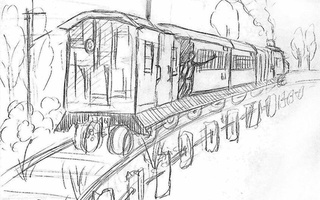The drawings of children are often populated with figures of family members, friends, and pets. For Jack, the five-year-old protagonist of “Room” by Emma Donoghue, this would be a difficult affair: the first five years of his life have been spent in a single room, and the only person he knows is his mother, whom he calls Ma. Instead of friends and family, his drawings might detail the other objects in his surroundings—he and his mother refer to “Room,” “Wardrobe,” and “Bed” as if they were other characters in the novel. Donoghue’s novel is not dissimilar to the simple drawings of a child, in which the lettering is plain, but the colors, values, and strokes of the crayon are detailed upon closer inspection. Told in Jack’s youthful voice, “Room” admittedly has a shaky beginning. But once Donoghue reaches her stride, her work emerges as a compelling story of human resilience.
Jack’s mother, Ma, finds herself caged in an 11-by-11 square shed for seven years after a ghastly kidnapping by a man they refer to as Old Nick. She gives birth to Jack during the second year of her imprisonment and is challenged to introduce him to the world using nothing but five books, a TV, her clever imagination, and good sense. The first chapter is mostly composed of an attempt to show the daily routines of mother and son. Jack is an obnoxious but innocent boy who has just turned five, and Ma is a worn, passive mother who adores her son and puts up with his whims. Although these scenes are undeniably crucial to the development of the book, they are too drawn out. Jack’s strange behavior, instead of being endearing, seems misplaced and awkward. Moreover, because at this point Donoghue has not yet given a reason as to why Jack and Ma are confined in the room, the detailed personification of their surroundings seems completely out of place.
As the book progresses, however, Donoghue’s writing style changes dramatically. She begins by writing in a choppy, scattered manner, making Jack seem somewhat absent in the head. He randomly spurts out declarations such as: “My two fingers zoom all around Room and nearly have a midair collision.” But immediately at the start of the second chapter, Jack becomes a more fully developed character. The book becomes more coherent as Donoghue explains the reason for their imprisonment and their immediate goal: escape. Now, Jack’s overly innocent character adds fuel to Ma’s increasing frustration and pushes her to realize their need to flee. Donoghue uses Ma’s inability to answer Jack’s questions to show just how small—figuratively and literally—the Room is. Ma’s relationship with Old Nick becomes increasingly puzzling to Jack as he begins to become aware of the maltreatment Ma endures. He acknwoledges, “Old Nick put those marks on her neck...actually that’s not dirt.”
Jack and Ma hatch plans to escape, and though the plans seem ludicrou sat first , Donoghue uses them as examples of Ma’s desperation. As the story unfolds, Ma changes from a two-dimensional character to a fully-fledged lost soul, who manages the strength to hold up her head as she tries to guide her son’s entrance into the real world. Jack’s unwillingness to participate in his mother’s whims shows just how much reality has been suspended for him.
Once they have emerged from “Room,” into what they refer to as “Outside,” Jack and Ma struggle to define themselves not only as separate entities from each other, but also as a parts of society. Jack is bombarded with a world that totally negates Ma’s best explanations. Society has as much trouble accepting him as he does accepting his new life. Ma, as happy as she is to be free, realizes that being back in the bigger world also means losing control of her own little world. “Room” begins with one room and ends with two. Donoghue impressively illustrates the changing relationship of the mother and son as they find their individuality and eventually reconnect with one another.
The strength of the book lies in Donoghue’s ability to critique reality through the thoughts of a five-year-old. Jack’s situation forms him into a perfect specimen of innocence. Jack observes, “I’ve been in the world three weeks and a half, and I still never know what’s going to hurt.” He recognizes, “I’m in the world all the time, I actually don’t know much, I’m always confused.” Donoghue uses the voice of Jack to create a commentary on the conventions of society, setting up his experience of the world as a contrast to that of humanity at large. Throughout the entire novel, Donoghue uses the changing relationships between Ma, Jack, and society to question the idea of innocence. Jack’s innocence becomes shaded by society, while Ma emerges from Room regaining some of the innocence lost from isolation from society.
Read more in Arts
Lectures Trace Development of WritingRecommended Articles
-
Sunday SpeakerThe Reverend Professor Lawrence P. Jacks, principal of Manchester College, England, will conduct the services in Appleton Chapel tomorrow morning.
-
No HeadlineSaturday afternoon the first Freshman crew rowed on the river in pair-oars. The crew has ordered a new set of
-
Geographers Are NeededThe Engineer Reproduction Plant, Washington, D. C. is in dire need of civilian personnel for geographic research. Seniors or graduates
-
Advising Program Taps TutorsHouses will appoint resident tutors to advise first-semester sophomores under a revamped advising program announced by the College last month.
-
 Harvard Houses Welcome Freshman Class
Harvard Houses Welcome Freshman Class -
 Donoghue’s Historical Latest a Mixed Collection
Donoghue’s Historical Latest a Mixed Collection














